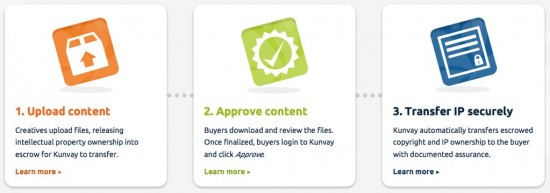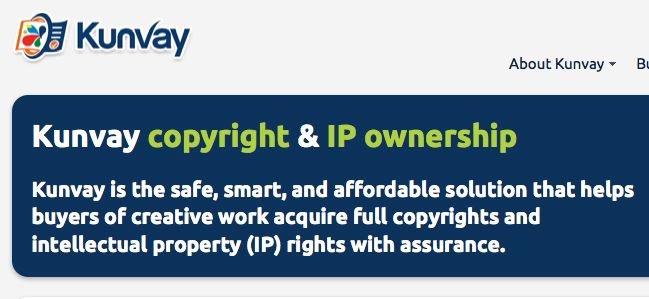Kunvay: Making Copyright Transfers Easier
 Some times, the hardest thing to do with a copyright is give it to someone else.
Some times, the hardest thing to do with a copyright is give it to someone else.
Work for hire makes it so that whatever you create as an employee is owned by your employer. However, while work for hire can apply to cases of freelancing or contracting it most often doesn’t.
Because of this, freelancers and contractors often “sell” works to clients without really transferring ownership. This means that, while the client can use the work, as per the implied license, the freelancer is often free to resell the work elsewhere or, in extreme cases, demand additional compensation later.
However, one startup is hoping to help fix that. Kunvay (pronounced “convey”) is a new company that is working to simplify and streamline copyright transfers and help both buyers and sellers sleep a bit better at night.
So what is Kunvay and how does it work? The answer is actually pretty simple.
The PayPal of Copyright Transfers
Reggie Solomon, the founder of Kunvay, recently said that he likes to think of Kunvay as “the PayPal of intellectual property transfers,” and the analogy is understandable.
For a flat fee paid by the buyer, Kunvay works a medium of transfer. The creator, after setting up an account, uploads the work they wish to transfer. The buyer then views the content and approves it at which point the contract takes effect and the copyright in the work is transferred.

The system currently works with designs, written content and photographs in cases where the intellectual property is valued at less than $10,000. The amount it costs depends on the number of files being transferred and the size of those files. For example, a small project with a single file (under 10 MB) will cost $19 to transfer but a larger project, up to 100MB or 50 files, will cost $199.
These costs are always borne by the buyer and Kunvay is completely free to use for creatives.
But as simple of an idea that the system is, it does provide some very interesting benefits to both buyer and creative.
Benefits and Positives
The main benefit of Kunvay is, ultimately, to the buyer. They get the copyright transferred to them in a legally-binding way and they don’t have to pay a lawyer to draft an agreement or wait for contracts to be passed back and forth online.
For companies that don’t do many copyright transfers, it’s likely a cheaper and easier solution to the problem.
However, the creative gains some benefits too. Not only is the work uploaded to a private place, but with a third party monitoring the exchange a client can’t simply take the work and start using a revised version of it, claiming to have never received it. The client will at least be tracked that they saw the original.
Most importantly for both sides, it greatly speeds up the process of executing arrangements where copyright needs to be transferred and does so, in most cases, at a price that is significantly cheaper than hiring an attorney.
Problems and Concerns
However, there are a few concerns that I do have with Kunvey.
First, Kunvay does not get involved in payments in any way. Though, theoretically, it could integrate with Google Checkout or PayPal to make sure a payment is made before releasing a work, it currently doesn’t do anything like that. This means, theoretically, a client could still take the work an not pay, which is a problem creatives also face without Kunvay being involved.
In fact, Kunvey’s escrow agreement (PDF) says plainly:
In addition, you agree and acknowledge that Kunvay’s services do not ensure that any Creative receives the agreed upon payment for his or her services, and that you are solely responsible for ensuring that the Creative is paid in full upon his or her completion of the work.
In short, Kunvay is not going to help make sure that you were paid for your work though, theoretically, the transfer would not be valid without it. Still, this does mean that another contract beyond Kunvay is needed to set payment terms, project scope, etc., meaning that lawyers are likely to be needed regardless of whether or not Kunvay is used.
Second, there are many projects for which Kunvay is clearly not right for. Not only will it not handle audio or video content, but it doesn’t always work well with the content that it does work for.
For example, if you’re a wedding photographer wanting to transfer copyright of hundreds of images to a client, there’s no plan available that lets you do that without multiple fees. Though you can upload zip files to their system (I was able to in a test) the file size limitation of 100 MB is much more serious. High-resolution images routinely take up more than 2 MB and, depending on format, that can easily climb to over 7 MB.
So while it may be fine for someone wanting to transfer text articles or a small website design, it doesn’t really work well for things with larger file sizes, unless you wanted to use it to transfer low-res versions and hand over the high-resolution ones later. However, that defeats much of the purpose of Kunvay.
Finally, I find it odd that the default jurisdiction of the agreements Kunvay uses is New York. This might be of much use to either the buyer or the creative. While normally I don’t pay much attention to the jurisdiction in a TOS, this is a service designed to help prevent costly legal disputes that. However, this element might actually make legal disputes more expensive for those involved if such a case went to court.
Bottom Line
When it’s all said and done, I’m trying to figure out exactly who Kunvay is for as it exists right now.
To me, Kunvay feels like an incomplete solution, especially from a creative’s standpoint. While I agree there are hassles in transferring copyright and it’s something is sometimes necessary, though not usually desirable for a creative, without some kind of payment verification it’s basically just a service that helps draft and sign a transfer agreement.
But even in that regard it’s limited, limited by the types of work it can accept and the number of such works it can process in one batch. It might be fine for transferring text work or even code, but a photography job with many high-resolution images is going to get pricey pretty quick.
Any company that regularly does such transfers will be better off just having an attorney draft a stock agreement they can reuse, possibly using something like Rightsignature to expedite the signing process. Only a limited number of people who do such transfers only occasionally will really benefit from Kunvay and, even then, they will still likely want to get an attorney involved to draft the scope of the work and other agreement elements.
Kunvay is a great idea and something I would love to see evolve and grow, but right now it’s just not a suitable replacement for existing systems in most cases. If it is able to add payment handling/monitoring, assist with USCO registrations/transfers (another service it doesn’t provide) and alter its pricing structure to make it practical for more projects, it might have a great niche for itself.
But as it is right now, I can’t imagine it being used very widely or appealing to many creatives as there is little in there for them.
It’s a great idea I’ll watch closely, but not something I’m going to go wild recommending.
Want to Reuse or Republish this Content?
If you want to feature this article in your site, classroom or elsewhere, just let us know! We usually grant permission within 24 hours.
